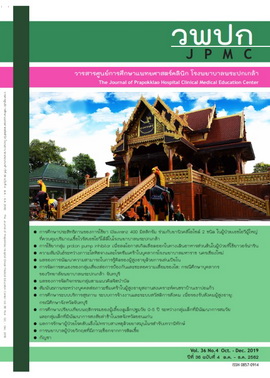The Effect of Interpersonal Psychotherapy Group Activities on Depression among Elders in Kao Bor Kaew Home for The Aged
Main Article Content
Abstract
Background: Numerous research studies have found the prevalence of elderly depression. Comparing the elderly in communities with the elderly in nursing homes has shown that the prevalence of depression is found at a more significant level among those in nursing homes.
Objectives: To develop and study the efficacy of a group activities program on the depression and interpersonal problems adaptation in elders.
Materials and methods: The program was developed in 12 group sessions by the researchers and validated by three experts. A total of 11 participants who have ≥20 scores on the Thai Mental Status Examination participated in the group sessions lasting 45 - 60 minutes twice a week. All participants completed the depression screening test (HRSR) and the Thai Interpersonal Questionnaire in both the pre- and post-interventions. Descriptive statistics and the Wilcoxon signed-rank test were applied when analyzing the data.
Results: The comparison of the average scores between the pre-and post-interventions showed the improved mean score in terms of depression at a non-statistically significant level. However, considering the set of positive questions with regard to the depression subdomain: peace of mind, meaning of life perception, and self-worth, the results showed the improved mean score at a statistically significant level of 0.05 in the post-test. Based on the interpersonal problems adaptation, the results showed the improved mean score in the grief domain but not in the interpersonal role disputes, role transitions, and interpersonal deficits domains at a non-statistically significant level.
Conclusion: The program was effective in the depression subdomain: peace of mind, meaning of life perception, and self-worth among elders. Although most of the scores of depression and interpersonal problems adaptation resulting from the post-assessments were not statistically significant, some of the individual qualitative data from the activities and interview sessions still presented the positive outcomes.
Article Details
References
Yaiyong O, Lueboonthavatchai P. Depression and grief of the elderly at the elderly associate in Nonthaburi Province. J Psychiatr Assoc Thailand. 2011;56:117-28.
Wongpoom T, Sukying C, Udomsubpayakul U. Prevalence of depression among the elderly in Chiang Mai Province. J Psychiatr Assoc Thailand 2011;56:103-16.
Phainrungruang R, Lueboonthavatchai P. Interpersonal problems and depression of the elderly at the elderly association in Phitsanulok Province. J Psychiatr Assoc Thailand 2015;60:23-34.
Suwattanakoop S. A comparison study of depression between the elderly living in own home and the elderly living in home for the aged, Mueang District, Chiang Mai [dissertation]. Bangkok : Chulalongkorn university; 2012.
Stuart S, Robertson M. Interpersonal Psychotherapy A Clinician's Guide. 2nd ed. London: CRC Press; 2012.
Heisel MJ, Talbot NL, King DA, Tu XM, Duberstein PR. Adapting interpersonal psychotherapy for older adults at risk for suicide. Am J Geriatr Psychiatry 2015;23:87-98.
Ngamjarus C, Chongsuvivatwong V, McNeil E. n4Studies: sample size calculation for an epidemiological study on a smart device. Siriraj Med J 2016;68:160-70.
Ezhumalai S, Muralidhar D, Dhanasekarapandian R, Nikketha BS. Group interventions. Indian J Psychiatry 2018;60(Suppl 4):S514-21.
Liu L, Gou Z, Zuo J. Social support mediates loneliness and depression in elderly people. J health psychol 2016;21:750-8.
Kong F, Ding K, Zhao J. The relationships among gratitude, self-esteem, social support and life satisfaction among undergraduate students. Journal of Happiness Studies 2015; 16:477-89.
Kasantikul D, Karnjanathanalers N, Limsuwan N, Thongtang O, Vuthiganond S, Khuangsirikul V, et al. Health-related self-report (HRSR) scale : the diagnostic screening test for depression in Thai population. J Med Assoc Thai 1997;80:647-57.
Lueboonthavatchai P, Thavichachart N. Universality of interpersonal psychotherapy (IPT) problem areas in Thai depressed patients. BMC psychiatry 2010;10:87.
Mulcahy R, Reay RE, Wilkinson RB, Owen C. A randomised control trial for the effectiveness of group interpersonal psychotherapy for postnatal depression. Arch Womens Ment Health 2010;13:125-39.
Ferizi JN, Mashhadi A, Amin Yazdi SA, Noferesti F. The effectiveness of short-term group interpersonal psychotherapy to symptoms of depression, emotional expressiveness, social skills and quality of life in depressed university students. Journal of Fundamentals of Mental Health. 2015;17:318-24.
Ravitz P, McBride C, Maunder R. Failures in interpersonal psychotherapy (IPT) : factors related to treatment resistances. J Clin Psychol 2011;67:1129-39.

